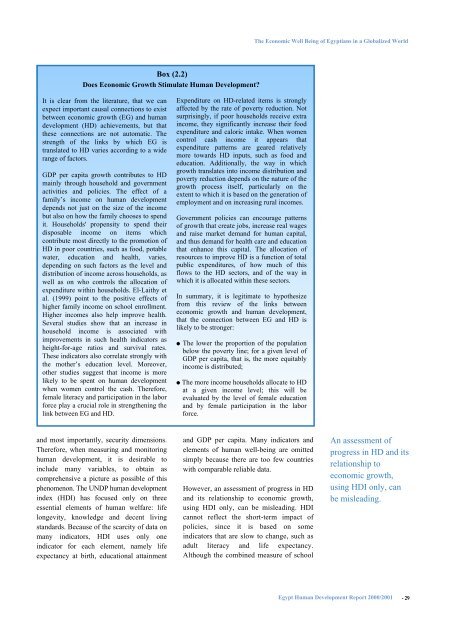English - Human Development Reports - United Nations ...
English - Human Development Reports - United Nations ...
English - Human Development Reports - United Nations ...
Create successful ePaper yourself
Turn your PDF publications into a flip-book with our unique Google optimized e-Paper software.
The Economic Well Being of Egyptians in a Globalized WorldBox (2.2)Does Economic Growth Stimulate <strong>Human</strong> <strong>Development</strong>?It is clear from the literature, that we canexpect important causal connections to existbetween economic growth (EG) and humandevelopment (HD) achievements, but thatthese connections are not automatic. Thestrength of the links by which EG istranslated to HD varies according to a widerange of factors.GDP per capita growth contributes to HDmainly through household and governmentactivities and policies. The effect of afamily’s income on human developmentdepends not just on the size of the incomebut also on how the family chooses to spendit. Households' propensity to spend theirdisposable income on items whichcontribute most directly to the promotion ofHD in poor countries, such as food, potablewater, education and health, varies,depending on such factors as the level anddistribution of income across households, aswell as on who controls the allocation ofexpenditure within households. El-Laithy etal. (1999) point to the positive effects ofhigher family income on school enrollment.Higher incomes also help improve health.Several studies show that an increase inhousehold income is associated withimprovements in such health indicators asheight-for-age ratios and survival rates.These indicators also correlate strongly withthe mother’s education level. Moreover,other studies suggest that income is morelikely to be spent on human developmentwhen women control the cash. Therefore,female literacy and participation in the laborforce play a crucial role in strengthening thelink between EG and HD.Expenditure on HD-related items is stronglyaffected by the rate of poverty reduction. Notsurprisingly, if poor households receive extraincome, they significantly increase their foodexpenditure and caloric intake. When womencontrol cash income it appears thatexpenditure patterns are geared relativelymore towards HD inputs, such as food andeducation. Additionally, the way in whichgrowth translates into income distribution andpoverty reduction depends on the nature of thegrowth process itself, particularly on theextent to which it is based on the generation ofemployment and on increasing rural incomes.Government policies can encourage patternsof growth that create jobs, increase real wagesand raise market demand for human capital,and thus demand for health care and educationthat enhance this capital. The allocation ofresources to improve HD is a function of totalpublic expenditures, of how much of thisflows to the HD sectors, and of the way inwhich it is allocated within these sectors.In summary, it is legitimate to hypothesizefrom this review of the links betweeneconomic growth and human development,that the connection between EG and HD islikely to be stronger:● The lower the proportion of the populationbelow the poverty line; for a given level ofGDP per capita, that is, the more equitablyincome is distributed;● The more income households allocate to HDat a given income level; this will beevaluated by the level of female educationand by female participation in the laborforce.and most importantly, security dimensions.Therefore, when measuring and monitoringhuman development, it is desirable toinclude many variables, to obtain ascomprehensive a picture as possible of thisphenomenon. The UNDP human developmentindex (HDI) has focused only on threeessential elements of human welfare: lifelongevity, knowledge and decent livingstandards. Because of the scarcity of data onmany indicators, HDI uses only oneindicator for each element, namely lifeexpectancy at birth, educational attainmentand GDP per capita. Many indicators andelements of human well-being are omittedsimply because there are too few countrieswith comparable reliable data.However, an assessment of progress in HDand its relationship to economic growth,using HDI only, can be misleading. HDIcannot reflect the short-term impact ofpolicies, since it is based on someindicators that are slow to change, such asadult literacy and life expectancy.Although the combined measure of schoolAn assessment ofprogress in HD and itsrelationship toeconomic growth,using HDI only, canbe misleading.Egypt <strong>Human</strong> <strong>Development</strong> Report 2000/2001 - 29
















